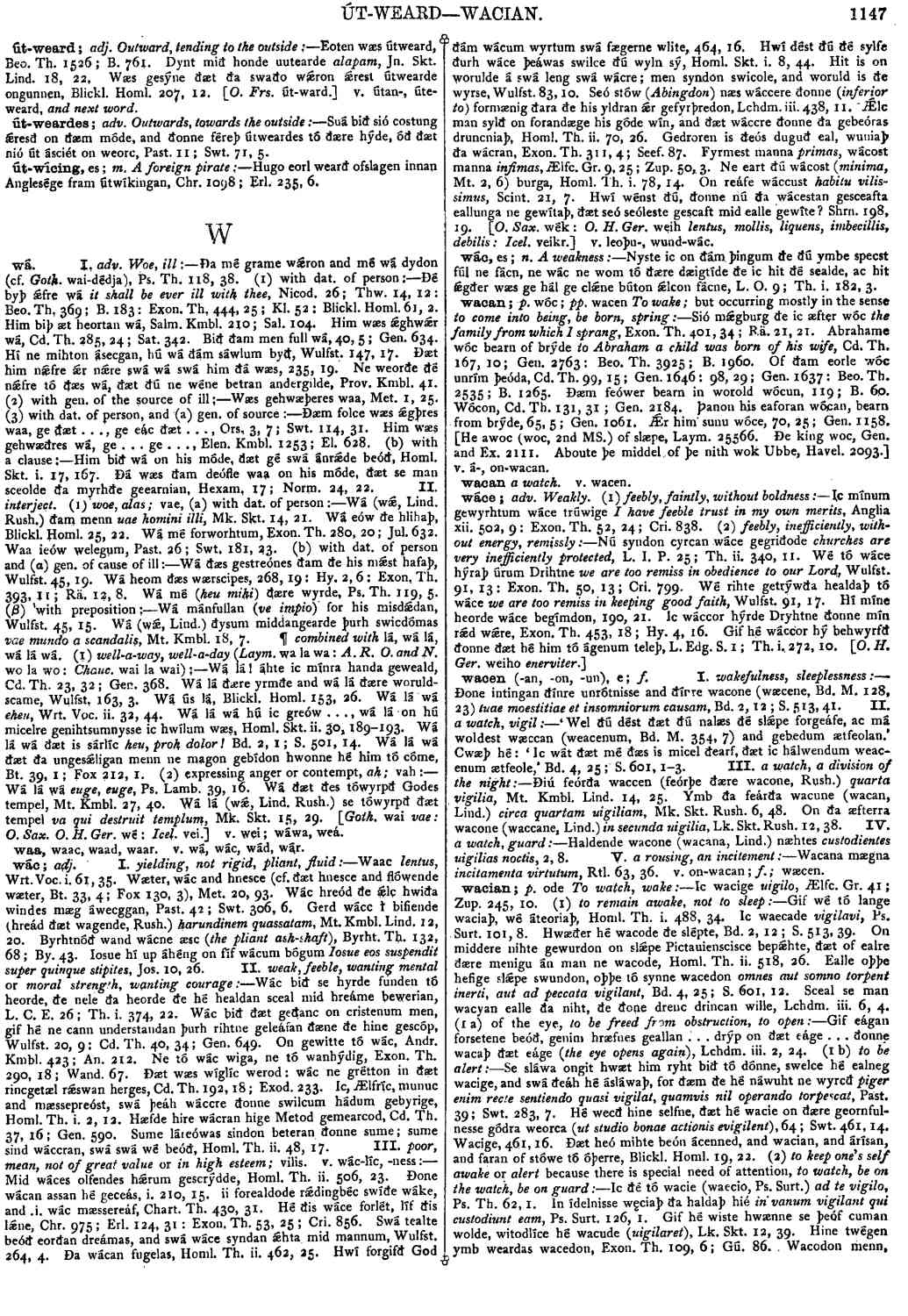wác
- adjective
-
Waac
lentus,
- Wrt. Voc. i. 61, 35.
-
Wæter, wác and hnesce (cf. ðæt hnesce and flówende wæter,
- Bt. 33, 4; Fox 130, 3), Met. 20, 93.
-
Wác hreód ðe ǽlc hwiða windes mæg áwecggan,
- Past. 42; Swt. 306, 6.
-
Gerd wácc ł bifiende (hreád ðæt wagende, Rush.)
harundinem quassatam,
- Mt. Kmbl. Lind. 12, 20.
-
Byrhtnóð wand wácne æsc (
the pliant ash-shaft
),- Byrht. Th. 132, 68; By. 43.
-
Iosue hí up áhéng on fíf wácum bógum
Iosue eos suspendit super quinque stipites,
- Jos. 10, 26.
-
Wác bið se hyrde funden tó heorde, ðe nele ða heorde ðe hé healdan sceal mid hreáme bewerian,
- L. C. E. 26; Th. i. 374, 22.
-
Wác bið ðæt geðanc on cristenum men, gif hé ne cann understandan þurh rihtne geleáfan ðone ðe hine gescóp,
- Wulfst. 20, 9: Cd. Th. 40, 34; Gen. 649.
-
On gewitte tó wác,
- Andr. Kmbl. 423; An. 212.
-
Ne tó wác wiga, ne tó wanhýdig,
- Exon. Th. 290, 18; Wand. 67.
-
Ðæt wæs wíglíc werod: wác ne grétton in ðæt rincgetæl rǽswan herges,
- Cd. Th. 192, 18; Exod. 233.
-
Ic,
Ælfríc, munuc and mæssepreóst, swá þeáh wáccre Ðonne swilcum hádum gebyrige, Homl. Th. i. 2, 12. -
Hæfde hire wácran hige Metod gemearcod,
- Cd. Th. 37, 16; Gen. 590.
-
Sume láceówas sindon beteran ðonne sume; sume sind wáccran, swá swá wé beóð,
- Homl. Th. ii. 48, 17.
-
Mid wáces olfendes hǽrum gescrýdde,
- Homl. Th. ii. 506, 23.
-
Ðone wácan assan hé geceás, i. 210,
- 15. ii
-
Hé ðis wáce forlét, líf ðis lǽne,
- Chr. 975; Erl. 124, 31: Exon. Th. 53, 25; Cri. 856.
-
Swá tealte beóð eorðan dreámas, and swá wáce syndan ǽhta mid mannum,
- Wulfst. 264, 4.
-
Ða wácan fugelas,
- Homl. Th. ii. 462, 25.
-
Hwí forgifð God ðám wácum wyrtum swá fægerne wlite,
- 464, 16.
-
Hwí dést ðú ðé sylfe ðurh wáce þeáwas swilce ðú wyln sý,
- Homl. Skt. i. 8, 44.
-
Hit is on worulde á swá leng swá wácre; men syndon swicole, and woruld is ðe wyrse,
- Wulfst. 83, 10.
-
Seó stów (
Abingdon) næs wáccere ðonne (inferior to )
formænig ðara ðe his yldran ǽr gefyrþredon,- Lchdm. iii. 438, 11.
-
Ǽlc man sylð on forandæge his góde wín, and ðæt wáccre ðonne ða gebeóras druncniaþ,
- Homl. Th. ii. 70, 26.
-
Gedroren is ðeós duguð eal, wuuiaþ ða wácran,
- Exon. Th. 311, 4; Seef. 87.
-
Fyrmest manna primas, wácost manna
infimas,
- Ælfc. Gr. 9, 25; Zup. 50, 3.
-
Ne eart ðú wácost (
minima,
- Mt. 2, 6) burga, Homl. Th. i. 78, 14.
-
On reáfe wáccust
habitu vilissimus,
- Scint. 21, 7.
- Hwí wénst ðú, ðone nú ða wácestan gesceafta eallunga ne gewítaþ, ðæt seó seóleste gescaft mid ealle gewíte? Shrn. 198, 19.
Bosworth, Joseph. “wác.” In An Anglo-Saxon Dictionary Online, edited by Thomas Northcote Toller, Christ Sean, and Ondřej Tichy. Prague: Faculty of Arts, Charles University, 2014. https://bosworthtoller.com/34180.
Checked: 0